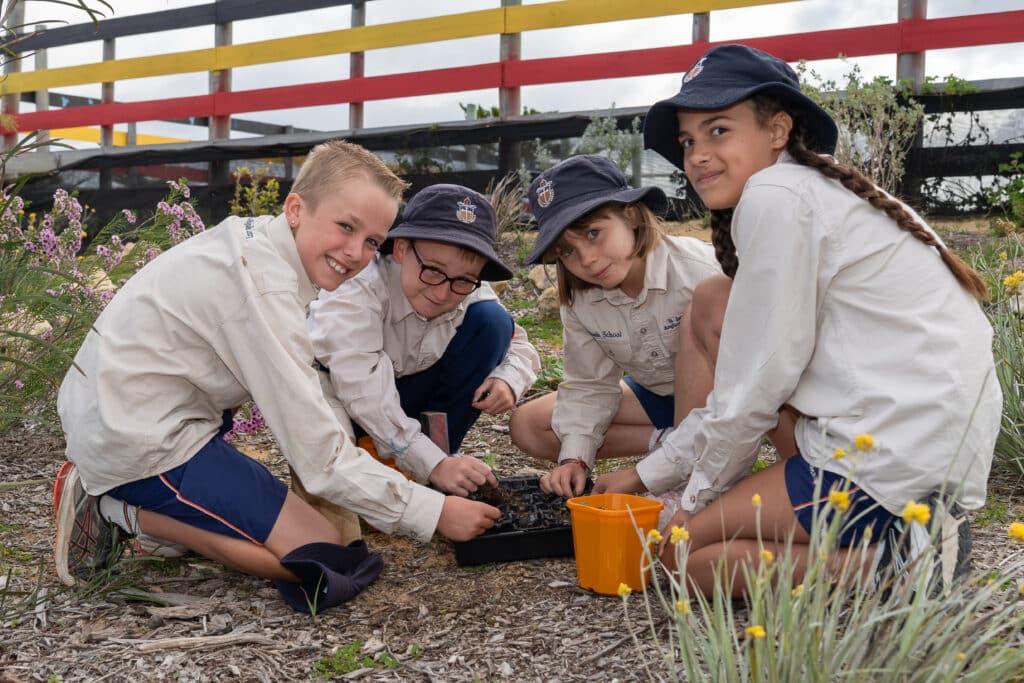Bush School and Outdoor Learning
Learning in Nature: Outdoor Spaces That Inspire Growth and Curiosity
At St James’, the outdoors is more than a backdrop, it’s an essential part of how our students learn, grow, and thrive. From bush-tucker gardens and vegetable beds to mature fruit trees and native habitats, our campus is alive with rich biodiversity.
Designed to nurture wellbeing, quiet reflection, and sustainability education, these green spaces are home to a wide variety of native plants, animals, and insects — offering students daily opportunities to engage meaningfully with the natural world.
Outdoor learning is embedded across the curriculum, bringing subjects to life through real-world experiences. Whether through outdoor classrooms, yarning circles, or environmental projects, students are encouraged to take safe risks, explore real-world challenges, and build skills that will serve them well beyond the school gates.

Bush School
With sustainability as our central theme, the St James’ Bush School Learning program enhances traditional classroom education by immersing students in the natural environment. Designed specifically for Year 4 students, this hands-on program fosters a deep, lasting connection with the land while nurturing curiosity, creativity, and environmental stewardship. By stepping outside the classroom and into the bush, students are encouraged to engage in responsible risk-taking, develop resilience, and learn to navigate challenges independently and collaboratively. From building shelters to exploring native flora and fauna, every activity is grounded in real-world learning that reinforces sustainable thinking and a sense of personal and collective responsibility for the future of our planet.
The natural environment
St James’ supports outdoor learning for students of all ages. As well as offering a range of stimulating outdoor learning spaces, the School offers an extensive list of co-curricular opportunities, which add significantly to the quality of each student’s school experience, while introducing them to a variety of opportunities for growth and development.
Students have unlimited access to our Djerabin Boodja, an expansive natural playground complete with native plants and trees where they can let their imaginations run wild. The area also features an earth oven, which is used to cook our annual traditional Hangi lunch.
Sustainability
At St James’ students connect with nature at every opportunity, allowing children opportunities to immerse themselves in nature firsthand is unforgettable. Students of all ages are shown the importance of sustainability and conservation across expansive outdoor learning environments. From sowing seeds and harvesting crops to designing and building habitats, students are taught about sustainability and encouraged to become responsible world citizens.
Outdoor learning environments
Our Bush School area features a dedicated yarning circle and outdoor learning tables, providing a safe and inspiring space for students to connect with nature. Here, children explore sustainability, safety, and Indigenous culture through hands-on, experiential learning.
Djerabin Boodja (meaning ‘happy place’), provides students with a natural environment where they can immerse themselves in nature and use their imagination. It includes a yarning circle, campfire and resources for building cubbies.
The Bush Tucker Garden is filled with edible native plants that were planted by students and staff. They are harvested and used for cooking experiences.
A working community garden where students, staff and parent helpers work together to maintain the fruit and vegetable crops. Students have a say in which crops are grown each season, and each year group cares for their own patch. The harvested crops are then sold at the Junior School market stall.
There are many herb planters and borders throughout the School grounds that are used by students for cooking and sensory learning activities.
As a specialist volleyball school, we’re proud to offer three on-site beach volleyball courts, giving students the unique opportunity to train and compete on sand year-round. These courts support skill development, team training, and a strong pathway to elite-level play.
Our outdoor stage provides a vibrant space where students can showcase their talents through lunchtime concerts, sharing music and performance with peers and families. It’s a fun and informal way to build confidence, creativity, and community spirit.
At St James’, our seasonal poles are a vibrant and educational feature of the school grounds, helping students learn about the six Noongar seasons through colour, art, and storytelling. Each pole represents a unique season, encouraging students to connect with local Aboriginal culture and the rhythms of the natural world.
The Japanese Garden provides a peaceful place for reflection and contemplation.
The Senior School oval is a large sports field used by Senior School students for various activities and sport lessons.
The Junior School playing field is a sports field located in the Junior School for sports and recreational activities.
The ELC nature playground is a hand-crafted timber playground designed to foster adventure and develop gross-motor skills.
The ELC pencil playground is a fully fenced lawn where ELC students can engage in outdoor learning and recreation.
The pirate ship playground is a hand-crafted timber structure and sandpit for all Junior School students to enjoy.
The bike track is a long gravel track that runs through the Djerabin Boodja. Students in Year 3 to Year 6 can bring their bikes from home and ride on the track daily.
The Junior School basketball court is a fully fenced multi-games area for Junior School students.
The Senior School basketball courts are hard courts that can be used for various sports and recreational activities.



